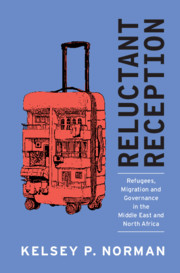Book contents
- Reluctant Reception
- Reluctant Reception
- Copyright page
- Dedication
- Epigraph
- Contents
- Figures
- Tables
- Acronyms
- Note on Translation
- Preface
- 1 Introduction
- 2 Host State Engagement in the Middle East and North Africa
- 3 Egypt
- 4 Morocco
- 5 Turkey
- 6 Differential Treatment by Nationality?
- 7 The Domestic Influence of International Actors
- 8 The Post-2015 Migration Paradigm in the Mediterranean
- 9 Conclusion and Avenues Forward
- Book part
- Notes
- References
- Index
4 - Morocco
From Raids and Roundups to a New Politics of Migration
Published online by Cambridge University Press: 26 November 2020
- Reluctant Reception
- Reluctant Reception
- Copyright page
- Dedication
- Epigraph
- Contents
- Figures
- Tables
- Acronyms
- Note on Translation
- Preface
- 1 Introduction
- 2 Host State Engagement in the Middle East and North Africa
- 3 Egypt
- 4 Morocco
- 5 Turkey
- 6 Differential Treatment by Nationality?
- 7 The Domestic Influence of International Actors
- 8 The Post-2015 Migration Paradigm in the Mediterranean
- 9 Conclusion and Avenues Forward
- Book part
- Notes
- References
- Index
Summary
Changes to the border crossings between Morocco and Spain in the 1990s and 2000s led to the buildup of groups of migrants and refugees residing in Morocco on a semi-permanent basis. Though most sub-Saharan African migrants lacked residency status and thus were unable to work formally, many subsisted on jobs in the informal economy and with the assistance of local and international NGOs that provided basic services. Morocco’s indifferent engagement approach changed abruptly in 2013 when King Mohammed VI introduced a major migration policy reform. While the government narrative puts civil society and migrant mobilization at the center of the reform, this explanation does not fully account for the timing of the 2013 changes. Sustained civil society pressure and the development of a pro-migrant rights network were critical for creating the opportunity to bring the issue of migration policy reform to the table, but it was international shaming led by transnational advocacy networks that ultimately forced the government’s hand and necessitated action. While the new policies changed the de jure situation for many migrants and refugees, most continue to eke out an existence through informal means, with the help of community ties, and by understanding the country’s norms.
- Type
- Chapter
- Information
- Reluctant ReceptionRefugees, Migration and Governance in the Middle East and North Africa, pp. 67 - 91Publisher: Cambridge University PressPrint publication year: 2020

